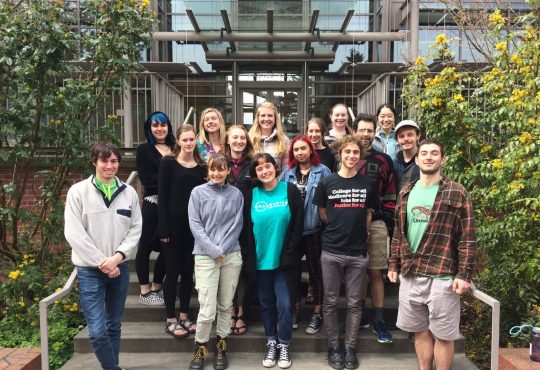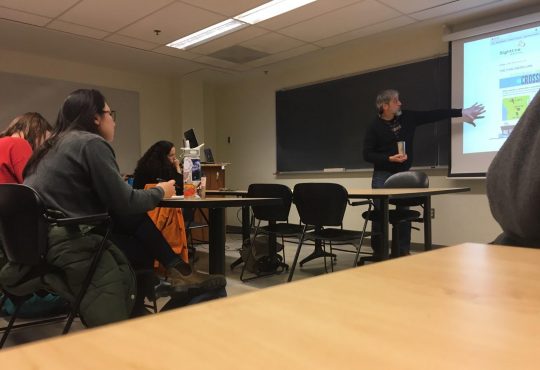To the University of Puget Sound’s Vice President for Finance & Administration:
Dear Ms. Mondou,
I am a concerned senior at the University of Puget Sound. In the past months, I have become increasingly aware of a trend across the nation urging educational institutions to stop investing their financial endowment in environmentally destructive industries, particularly the fossil fuel industries of oil, coal, and natural gas.
As a young person, I believe that reducing our nation’s dependence on fossil fuel based energy, whether domestic or international, is an imperative condition to ensure the United States’ future prosperity. Progress in this direction is impeded by the economic omnipotence of the fossil fuel industry and the control over domestic policy that this affords. Fossil fuel companies are an obvious player in global dynamics that poison our air and water, disenfranchise vulnerable communities, and have, through climate change, made extreme weather events a clear and present danger. As a stakeholder and investor in private energy companies, the University of Puget Sound has a social responsibility to remove our investment in industries that gamble with the health, security, and quality of life of mine and future generations.
The University of Puget Sound holds endowment investments of more than $314 million. Investment in natural resources, including private energy, has more than quadrupled in the last 7 years, spiking from $6.38 million in 2007 to $28.65 million in 2013. From 2012 to 2013, investment in private energy nearly doubled. The University of Puget Sound is currently investing over $20 million in private energy holdings, and it appears from the available data that this trend is meant to continue. The financial reports do not go into more detail, but I can only hope that private energy is not merely a euphemism for Chevron, ExxonMobil, BP, and Peabody Coal. While I understand the benefit afforded to students and staff of the University through high yield investments, I do not believe that we must sacrifice our moral obligation to invest ethically to achieve acceptable returns of at least 5%. Due to massive and sudden fluctuations in supply and demand as well as the continued inevitability of environmental disasters such as the 2010 Deepwater Horizon oil spill, fossil fuel investments are inherently volatile. Additionally, these investments’ high returns represent merely a fraction of the immeasurable value private energy companies extract from communities and the environment.
Section XIV of the University of Puget Sound Investment Policy Statement For Pooled Endowment Investments suggests that the Investment Subcommittee of the Finance and Facilities Committee consider Socially Responsible Investment (SRI) strategies, such as “refusing to own shares of a company because of a disagreement with that company’s business practices.” I believe that social responsibility obliges the Committee to reject investment in companies whose practices undermine our future and contribute to pollution, human rights abuses, and climate change. I am confident that forward-thinking members of the Board of Trustees are capable of working with investment managers to adjust the University’s investment portfolio to more adequately reflect the values embraced by the campus community and President Thomas’ Strategic Plan.
The University of Puget Sound’s Strategic Plan presented by President Ronald Thomas and fully endorsed by the Board of Trustees maintains that “the Puget Sound experience embraces our dynamic Pacific Northwest environment [and] our independent and pioneering people who are civically engaged, environmentally responsible, and globally focused.” It is our collective responsibility as a leading national liberal arts college and an important institution in the Pacific Northwest to invest in industries that reflect the values espoused in this vision for the University. The Northwest is intimately tied to the greater fossil fuel industry. Already a major hub for the transport of crude oil, natural gas, and coal, the Puget Sound region is being targeted for increased exposure from fossil fuel industries. Each day that more open-car coal trains and oil tankers pass through our region, the chances increase that a single oversight will cause irreparable damage to the shores and waters of the Puget Sound. An Exxon Valdez magnitude spill in the inner Puget Sound is terrifyingly possible and, I fear, ultimately inevitable if fossil fuel industries are not held accountable for their environmental impact. The University of Puget Sound has the worthy opportunity to make a statement on what we stand to lose because of these industries’ unsustainable and reckless practices. We can prove our commitment to environmental stewardship and institutional leadership by bravely acting with the vanguard of socially conscious, critically aware institutions such as Stanford University, Pitzer College, College of the Atlantic, The Russell Family Foundation, The Rockefeller Brothers Fund, and many city governments including Seattle, Portland, San Francisco, Santa Fe, Boulder, and Providence who have publicly pledged to reduce or eliminate their investment in fossil fuel industries. It is irresponsible not to do so.
I understand that divestment is not as simple a process as we would like it to be. However, there are many steps that can be taken immediately that will point the University in the right direction. We can ensure that all short term and liquid assets are responsibly invested. We can make a pledge to halt any new investment that may support any of the top 200 publicly traded fossil fuel companies. And we can amend the University’s Investment Policy Statement to direct outsourced investment managers such as Perella Weinberg Partners to take SRI into account when investing Puget Sound’s endowment. As illiquid investments become accessible over the next 10 years, we can ensure that those funds are reinvested with endowment management firms that value environmental responsibility as well as maximum returns. Many resources are available to the Board in these tasks, such as the Forum for Sustainable and Responsible Investment, Bloomberg’s Environmental Data Service, and stock indexes that include Standard & Poor’s Carbon Efficiency Index, the Dow Jones Sustainability Indices and the MSCI Global Sustainability Indexes.
Ultimately, divestment isn’t primarily an economic strategy, but rather an ethical and political one. Educational institutions in the United States hav
e often taken a leading role in the social battles of their time. Divestment campaigns, spearheaded by universities around the nation, changed the national conversation on apartheid-era South Africa in the 1980s and on the tobacco industry in the 1990s.
We have a chance today to edge the discourse of energy toward a vision that places greater emphasis on clean, renewable sources such as wind and solar. I am proud to be a Logger, but I would be ecstatic to count myself as a member of a university that was at the forefront of effecting change in the way we power our world. Socially Responsible Investing must be more than an afterthought in the way we invest our endowment. As a national presence among liberal arts colleges and a regionally important actor in cultural and public policy initiatives, it is the moral duty of the University of Puget Sound to seriously examine our investments and act now to divest from environmentally destructive fossil fuel industries.
Sincerely,
Luke Janssen
Class of 2015
P.S. I urge all those who read this letter to think critically about how the University’s investment choices reflect on you and your place in this community. If you agree with me that change is necessary, reach out to those around you who are already working toward making a difference. Visit gofossilfree.org, divestinvest.org, or 350.org for more information about why divestment is the right choice and how to begin fighting for a sustainable future.







